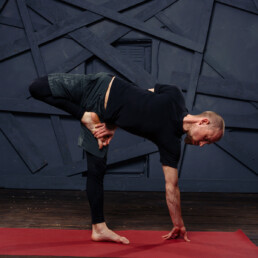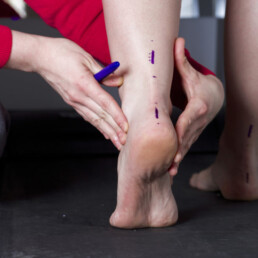In all developed countries around the globe, from the moment that we are able to properly recognise and interact with the world around us, our lives get increasingly intwined and pulled along at brake neck speeds. With the advent of technology, it starts from our exposure as a young child through television and continues to draw traction into our lives through mobile phones, portable computers and more recently, voice commanded artificial intelligence (AKA Alexa!). It is through technology that the boundaries between our home lives, work lives, social spheres and professional environment are all becoming mixed up into a hazy blur, which has the potential to lock our brains into a state of perpetual motion!

If you couple the growing infiltration of technology into every aspect of our waking lives, along with the increasingly accepted and admired social attitude for the need to be constantly busy, the physical practice of rest and relaxation is becoming a long forgotten art. Our weekends have seemingly become the only time where we are able to actively engage within any form of rest. Unfortunately, the same intense attitudes that we have thrown into our working environment have also permeated into our down time. Going out with your friends without any realisation as to how much alcohol you are drinking, pushing yourself everyday to the absolute limit during your high intensity metabolic conditioning class and over indulging upon a whole pint of Ben & Jerry’s ice cream, as a reward for reaching your fitness goals for the week. For many of us, the way in which we engage within relaxation seems to be more of a reaction and coping mechanism to the constant physical, emotional, visual and mental bombardment that we experience on a day to day basis; as opposed to the act of relaxation being a positive experience in which we are able to fully rejuvenate our bodies and minds.

The decline of good mental and physical health within our society can serve as a reflection of the relentless over stimulation and emotional stress that we are exposed to. The World Health Organisation has stated that “Stress” is the number one health epidemic of the twenty first century. In 2019, around 60-90% of all visits to our doctors, were due to stress related ailments or complaints. Our depleting resilience to this hidden strain upon our wellbeing is reducing year by year. The result is that the percentage of the UK population who are suffering with a mental health disorder has continued to rise from 15% to 20%, over the last thirty years. A staggering one in five of us are now battling against some form of mental health disorder and the younger generation of 16 to 24 year olds are a part of our population who are most affected by this.
 In reality, there are a multitude of causes for the declining mental and physical health of our population, and the interactions between them are both complex and far reaching. Everyday we are continually exposed to information in the form of nutritional and exercise advise to help stem the tide of our declining health. Unfortunately, due to whatever reasons, the recommendations that we receive which actively try to teach us how to relax, seem to be pushed into the background in terms of importance. I believe that our ability to properly rest, recover and rejuvenate ourselves is a lost forgotten art, and the importance to relearn the wisdom of relaxation from our predecessors is much more significant than we realise. Over the last 50 years, the development and exploration into new scientific fields of Positive Psychology, Psychoneuroimmunology and Neuroscience have all been able to shine a light upon how the state of our mind and nervous system can significantly impact our immune system, our ability to perform better (both physically and intellectually), how long we live and generally, our ability to flourish as human beings. These new scientific fields have helped us to better understand some of the mechanisms for how practices such as mindfulness, breathing practice, massage, empathy and clearing your mind, can significantly improve our longevity, health, performance, happiness, social relationships and emotional resilience to stress.
In reality, there are a multitude of causes for the declining mental and physical health of our population, and the interactions between them are both complex and far reaching. Everyday we are continually exposed to information in the form of nutritional and exercise advise to help stem the tide of our declining health. Unfortunately, due to whatever reasons, the recommendations that we receive which actively try to teach us how to relax, seem to be pushed into the background in terms of importance. I believe that our ability to properly rest, recover and rejuvenate ourselves is a lost forgotten art, and the importance to relearn the wisdom of relaxation from our predecessors is much more significant than we realise. Over the last 50 years, the development and exploration into new scientific fields of Positive Psychology, Psychoneuroimmunology and Neuroscience have all been able to shine a light upon how the state of our mind and nervous system can significantly impact our immune system, our ability to perform better (both physically and intellectually), how long we live and generally, our ability to flourish as human beings. These new scientific fields have helped us to better understand some of the mechanisms for how practices such as mindfulness, breathing practice, massage, empathy and clearing your mind, can significantly improve our longevity, health, performance, happiness, social relationships and emotional resilience to stress. 
This all starts with re-learning how to give yourself a break everyday (no matter how small) and prioritising your engagement within the practices of relaxation, with as much vigour as you prioritise your health through eating a good diet and going to the gym. Like any practice which involves the development of new habits, start with small daily gestures and let them grow from there. The underlying message that you are trying to emphasize within this new habit formation is that YOU ARE IMPORTANT, and your commitment to giving yourself regular relaxation time is the daily action that serves to reflect your belief towards how much you value yourself.

In line with the spirit of starting your journey to happiness from small beginnings, here are a few simple things to help you give your mind, as well as your body a much needed break from the perpetual chaos of our daily lives.
1) Take up a short, daily breathing practice. The practice of breathing has been around for centuries, but only since the last forty years has science really been able to understand and highlight the beneficial health effects that this ancient practice can confer upon us. Breathing exercises are one of the most simple things that you can do to help stimulate the process of recovery both mentally and physically. One of the key mechanisms behind this, is through the stimulation of a nerve in your body called the Vagus nerve. Turning on activity in the vagus nerve is essential to helping our bodies and minds recover, and this is very simply accessed through taking a slow, long outward breath. The health benefits of breathing can be accessed by us all from a small commitment of only a few minutes everyday. The key to gaining the health benefits is through consistency and sometimes not even how long you practice for. A good place to start would be the 3-4-5 breathing exercise recommended by Rangan Chatterjee or any simple breathing exercise found within the practice of Yoga and/or Tai Chi.
2) Go for a daily walk in nature. If you find it hard doing mindful exercises in order to give your mind a small break, why don’t you try going for a walk in the park and in places with trees, plants and grass. Research has found that greater exposure to natural environments (such as parks, woodlands and beaches) is associated with lower risks of heart disease, diabetes, mental health problems, asthma and obesity. Going for a walk, run or undertaking physical activities in these natural environments has been positively associated with living longer and increased physical well-being. Make a point of going for a walk being surrounded by nature, to help boost your mood, increase your immune system and keep you healthier.
3) Grab a massage to help you mind AND your body recover. The sense of touch, when used appropriately and positively, can be an extremely useful tool for helping to disarm the physical and emotional effects of stress. Research has shown that when touch is positively applied at a certain speed and pressure, along with being able to help accelerate the recovery of your muscles from a mechanical perspective; it also directly communicates with a part of brain called the limbic system which switches your body’s nervous system into a state of repair and recovery for both your emotional system and your body. Having a massage once in while can not only help you to enjoy the recuperative mental and physical benefits that is has to offer, but it is also a great opportunity to give yourself a bit of well deserved break from the chaotic routine of daily life.
If you like what we have to say and wish to find out more possible ways in which to help positively support your emotional health and happiness, please feel free to drop us an email (evorehab@gmail.com) and one of our team would be more than capable to help you with your query.



